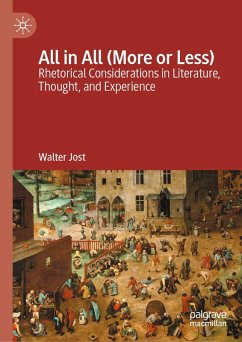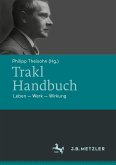"Here is a bold new book that, if read with care, may well re-orient studies in the humanities. Pluralism and rhetoric appear here brighter than ever, Brandom and Wittgenstein do work we never expected of them, and we learn to read Elizabeth Bishop, Edith Wharton and Twelve Angry Men better than we ever imagined to be possible."
-Kevin Hart, Duke University
This book reinvents aspects of the rhetorical tradition as part of a philosophical pluralism oriented to "the whole of things". Its chapters unfold some of the ethical and intellectual responsibilities philosophy and rhetoric share, their commitments toward literature broadly conceived, the limited authority of their interpretations, and the kinds of judgments they issue in. Part One, drawing chiefly on Ludwig Wittgenstein and Richard McKeon, leverages a central line of argument regarding "Rationality" in the pragmatism of Robert Brandom. Part Two pivots to specific instances of the range of rhetorical argument found in surprising places and in sophisticated arrangements. The book as a whole culminates in Part Three, where the author demonstrates how "ordinary language criticism" fruitfully bears on cultural models - film, drama, novels, poetry -belonging to "American Low Modernism."
Walter Jost is Professor of English at the University of Virginia, USA, and author of Rhetorical Thought in John Henry Newman and Rhetorical Investigations. He has edited or co-edited seven other books, among them Rhetoric and Hermeneutics in Our Time and Ordinary Language Criticism: Literary Thinking After Cavell After Wittgenstein.
-Kevin Hart, Duke University
This book reinvents aspects of the rhetorical tradition as part of a philosophical pluralism oriented to "the whole of things". Its chapters unfold some of the ethical and intellectual responsibilities philosophy and rhetoric share, their commitments toward literature broadly conceived, the limited authority of their interpretations, and the kinds of judgments they issue in. Part One, drawing chiefly on Ludwig Wittgenstein and Richard McKeon, leverages a central line of argument regarding "Rationality" in the pragmatism of Robert Brandom. Part Two pivots to specific instances of the range of rhetorical argument found in surprising places and in sophisticated arrangements. The book as a whole culminates in Part Three, where the author demonstrates how "ordinary language criticism" fruitfully bears on cultural models - film, drama, novels, poetry -belonging to "American Low Modernism."
Walter Jost is Professor of English at the University of Virginia, USA, and author of Rhetorical Thought in John Henry Newman and Rhetorical Investigations. He has edited or co-edited seven other books, among them Rhetoric and Hermeneutics in Our Time and Ordinary Language Criticism: Literary Thinking After Cavell After Wittgenstein.
Dieser Download kann aus rechtlichen Gründen nur mit Rechnungsadresse in A, B, BG, CY, CZ, D, DK, EW, E, FIN, F, GR, HR, H, IRL, I, LT, L, LR, M, NL, PL, P, R, S, SLO, SK ausgeliefert werden.









